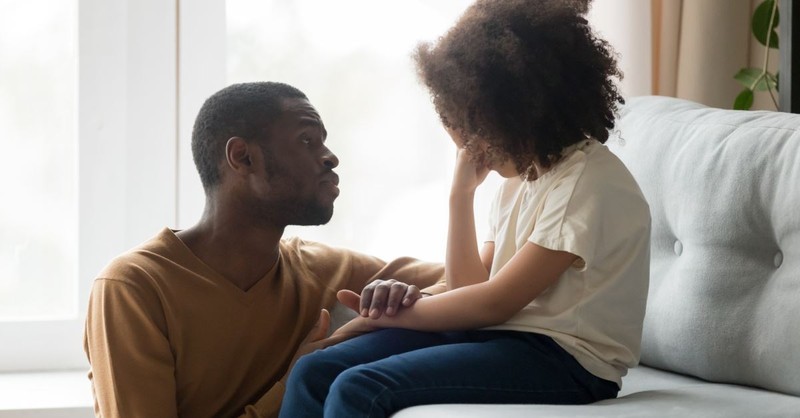
I’ve lost count of how many times my daughters have rolled their eyes when I’ve cautioned them about social media, digital content, and the amount of time they spend on their devices. They continually play down my fears and tell me I’m being irrational. Meanwhile, I’m still biting my nails.
The truth is, they think they have it under control, that they’re using good protective measures, and that they no longer need me hovering. But the truth is, their frontal lobes are not fully developed; the tech industry (and porn industry and child exploitation industry) are all far more advanced than my children (and me, for that matter).
I read countless articles that show how our phones are changing the way we process information. They’re driving addictions and creating access to things that no one needs access to, least of all kids.
During one conversation with my eldest, after the obligatory eye-roll, I got firm with her: “I need you to understand that we are the first group of parents that have had to raise children in this digital age. No one has done this before, and we are just doing the best we can.”
Here are 5 things I’ve learned about parenting kids in the digital age, along with a few tips for navigating these uncharted waters:
Photo Credit: pixabay

1. There are multiple ways your kids can be exposed to things you wish they hadn’t been.
First, no Internet filter will block everything. It’s simply impossible to stay on top of the advancement of technology and how we use the Internet. In fact, one Internet software company recently revamped their whole accountability system because just looking at URLs no longer captured all the ways harmful content could infiltrate devices.
Even if you could lock down your children’s devices (or refrain from giving them one), it is highly probable they will see something inappropriate on a friend’s device.
And don’t think the school Wi-Fi will be much help at all. Once, while my daughter and her friend were doing a research project online in school, she clicked on the wrong tab on her friend’s computer. And right in front of her was a paused movie featuring lesbian pornography.
Navigational tip: Keep in the know as much as you can. You can’t know everything and that’s okay. We all do the best we can. I find that sometimes it’s helpful to engage with my kids about new apps. If they’re teaching me how to make a boomerang for Instagram, I can also ask them other questions: How are they using Instagram? Who are they connecting with? How do posts like “x” make them feel? What does this acronym mean?
Photo Credit: GettyImages/vinnstock

2. Developers determine age ratings.
I cannot count the number of times I have simply looked at the age rating for an app and then approved it for my kids’ devices. “4+? No problem,” I thought.
I mistakenly believed that an outside agency reviewed the age-appropriateness of the app’s content, much like movies are rated by the MPAA and video games are rated by the ESRB.
But, no. App developers rate their own apps, which means there is zero oversight, zero accountability, and probably zero research going into what is really appropriate for whom.
Navigational tip: On devices running Apple iOS, you can create a setting within family sharing that requires kids to get their parents’ permission before they can download an app. You can give permission either directly on their device or on your device through the notification you’ll receive when they request it. Before you approve, check out independent sites that review apps such as Common Sense Media. They will give you a more holistic picture of what is good and bad about the particular app.
Photo Credit: GettyImages/BernardaSv

3. Ads can be more harmful than games.
The sad part about a majority of the free apps kids want is the fact that they’re free because developers rake in their money from advertisements. My kids and I have a great time playing each other in word games. That is until the ads pop up after each play showing busty cartoon drawings advertising an adult game.
Navigational tip: Here you have a few options:
Photo Credit: GettyImages/Chalabala
- Teach your kids to look away, (but remember—frontal lobes not fully developed).
- Invest the money to buy the paid, ad-free version of the games they love. You could also give them an iTunes/Google Play gift card so they have a finite amount to spend each month (make sure you have your parental controls ready to go).
- Tell them they can’t have any apps that show inappropriate advertisements. Unpopular choice? Yes. But also wise.
Photo Credit: GettyImages/Chalabala

4. Conversations are the most important thing.
Perhaps since the beginning of time, conversations about sex between parents and children have been uncomfortable. Why else would we continue to call it “the birds and the bees”? I mean, really, it is hard. It is uncomfortable. Our kids may ask us uncomfortable questions. But if we will demonstrate that we are a safe place to bring hard, uncomfortable questions, it will be less likely that they will pursue information from less reputable sources.
The truth is, while digital devices provide many opportunities to explore all things sex-related, there are also many other things you must talk about regarding digital devices. Through it all, remaining calm, open, and reliant on Jesus will create a space that your children will feel safe coming to when bad things happen.
Navigational tip: Evaluate the types of conversations you’ve already had with your kids and start praying about other conversations you need to have. Have you talked about what it means to be a good digital citizen? What about pornography? Cyber-bullying? FOMO? If not, start looking for natural opportunities to bring these topics up with your kids.
Photo Credit: GettyImages/fizkes

5. It takes a village.
You will never be able to be all things to your kids. You won’t be able to prevent every fall (physical or virtual) or protect from every heartache. You’ll miss things in real life and in the digital world.
This is one reason why you and your children need solid relationships with other adults who are on the same page when it comes to navigating the digital world. When you come across someone who isn’t part of your village and has different ideas than you do, let the judging go. When another parent questions something your kid has posted on social media, be thankful they’re bringing it to your attention.
Remember, we’re the first generation to do this, which means we all have a lot to learn. Let’s support each other, love each other, and learn from each other. Nothing brings division faster than making snap judgments and assumptions.
Navigational tip: Let other parents know how you are trying to keep your kids safe and listen to their ideas, too. Come up with mutual guidelines everyone will follow when your kids are at each other’s houses. Let your kids know that if they don’t feel comfortable talking to you about certain topics, they can go to these specific adults.
We all joke about how children don’t come with instruction manuals, but how many books are out there about child development? I searched “books on children’s development” on Amazon, and there were 7,000 titles to choose from. And while I know there are now books about parenting in the digital age (there are 1000; I checked), the truth is, we don’t truly know the effects the digital age will have long-term. At least, not yet. And so, like all generations that have faced something new, we fumble through. We do things correctly and we do things incorrectly.
And we hope and pray a lot.
 Jen Ferguson is a wife, author, and speaker who is passionate about helping couples thrive in their marriages. She and her husband, Craig, have shared their own hard story in their book, Pure Eyes, Clean Heart: A Couple’s Journey to Freedom from Pornography and are also creators of the Marriage Matters Prayer Cards. They continue to help couples along in their journeys to freedom and intimacy at The {K}not Project. Jen is also a mama to two girls and two high-maintenance dogs, which is probably why she runs. A lot. Even in the Texas heat.
Jen Ferguson is a wife, author, and speaker who is passionate about helping couples thrive in their marriages. She and her husband, Craig, have shared their own hard story in their book, Pure Eyes, Clean Heart: A Couple’s Journey to Freedom from Pornography and are also creators of the Marriage Matters Prayer Cards. They continue to help couples along in their journeys to freedom and intimacy at The {K}not Project. Jen is also a mama to two girls and two high-maintenance dogs, which is probably why she runs. A lot. Even in the Texas heat.
Photo Credit: pexels/rawpixel
Originally published Tuesday, 16 April 2019.



